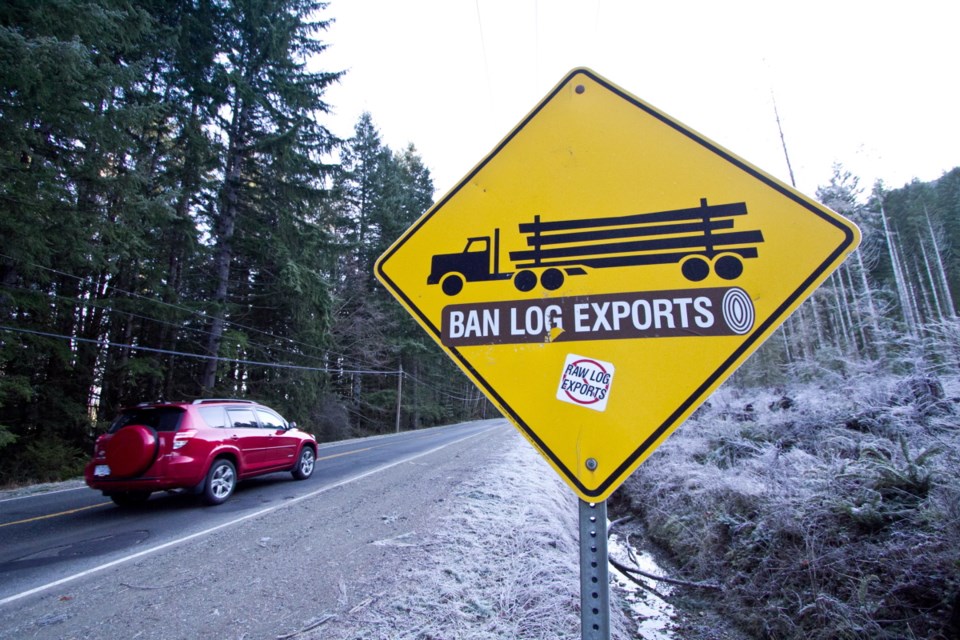The volume of raw logs exported from B.C. more than tripled between 2002 and 2012, prompting forestry workers to join with the Ancient Forest Alliance to push for more stringent log-export restrictions.
During the last decade, 30,000 forest workers lost their jobs and more than 70 mills shut down, said Arnold Bercov, Pulp, Paper and Woodworkers of Canada forestry officer.
“The B.C. Liberals have decimated the province’s forestry workforce through massive raw-log exports, industry deregulation and unsustainable jobs,” he said. “We lost both our forests and our jobs. It’s nuts.”
However, Forests Minister Steve Thomson said it was necessary to increase raw-log exports to protect jobs during an economic downturn.
“The increased value available from the export of logs helped keep harvest rates up and that kept people employed and kept coastal communities going,” Thomson said.
“I think we would all agree that we would rather add value here and have those logs manufactured here, but we recognize that, in the economics of the coastal industry, we need exports to keep the level of harvest up. That services mills and keeps additional jobs going.”
Overall exports for the province are about 10 per cent of the total harvest, which makes it important in the economics of the coastal industry, Thomson said.
The union and the Ancient Forest Alliance, a conservation group, want policy changes to protect remaining stands of old growth and to push the industry into retooling coastal mills to process second growth.
Over the last decade, more than 47 million cubic metres of raw logs were exported from Crown and private lands.
The province issues permits for exports from Crown land when logs are declared surplus to the needs of local mills, but the federal government is responsible for export permits from private land.
The figures show that the equivalent of almost three million loaded logging trucks of raw logs were exported from B.C. between 2002 and 2012, said Ken Wu, executive director of the Ancient Forest Alliance.
In 2002, according to provincial government figures, 1.5 million cubic metres of logs were exported from Crown lands and 2.3 million cubic metres from private lands.
Last year, four million cubic metres were exported from Crown lands and 2.4 million from private lands.
The lowest years for exports from Crown lands were 2007, with 900,000 cubic metres, and 2008, with one million cubic metres going to China, Japan, South Korea and the U.S.
Wu also blames the province for much of the increase in exports from private lands, since, in 2004 and 2007, Island Timberlands and Western Forest Products were allowed to remove huge swaths of land from tree farm licences.
If that hadn’t happened, jurisdiction would have remained with the province.
Modern mills in the interior of the province are designed to handle smaller trees, but on the coast, most mills have not retooled to process second growth.
That can largely be explained by the government removing local milling requirements in 2003, Wu said. Prior to the change, companies were required to mill logs at specified local mills, but after 2003, many simply shipped them to Vancouver or overseas.
“That allowed tenured logging companies to shut down their mills instead of being forced to retool them to handle the changing forest profile,” he said.
Thomson said that if the Liberals are re-elected, they will work to make the industry as competitive as possible through low tax rates and regulatory costs.
“We have put in over $900 million in investment in the industry, despite the downturn. I would expect, as the market improves, to see investment in the mills,” he said.
Changes in January to the log-export system saw government fees reduced for companies cutting low and mid-grade logs in an effort to increase harvesting while curtailing exports.
The NDP has pledged to limit log exports and reinstate a jobs-protection commissioner.


